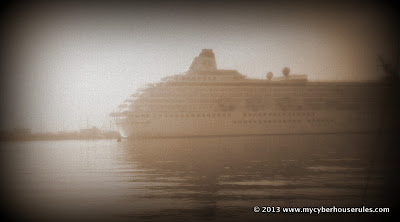In response to another writing prompt from my friends at STUDIO 30 PLUS...
[For this one, I'm going to allow a peek into the still-very-rough first draft of one of my NaNoWriMo zombie novels. There aren't any zombies in this scene, but whatever. My protagonist and his dog still don't quite know what's going on, at this point...]
He tried the satellite phone a few
times, once actually connecting (more or less) with Bart. Apart from proving to each that the other
was alive, the conversation provided little more than frustration, with Bill yelling
"what's going on?" and Bart yelling "where are you?"
simultaneously, until after a minute the connection was lost. By just after dark, Bill had reached St.
Kitts, which put him maybe a day or two from the Virgin Islands and Puerto
Rico.
Here, his exhausted little
psyche took another hit. As they approached
Basseterre's Port Zante, with its cruise ship terminal and mega-yacht marina,
Bill eased past a massive Royal Caribbean liner, apparently adrift, about two miles
offshore. No fire or passengers were
visible, but he thought for a moment that he could hear distant screaming and yelling. Also, smoke was pouring from the ship.
It was beyond acrid. Bill gagged
and choked and pulled his shirt over his face.
It smelled like burnt hair and raw sewage and body odor all went
swimming in vomit together, then wrapped themselves in Styrofoam and lit the
whole thing on fire. Doug threw up a
little at his master's feet, then hid in the cabin until the smoke thinned.
Closer to the Basseterre waterfront,
Bill spotted what looked like a big red and white sail ahead of him. As he got closer, he saw that it, too, was
smoking a little. As he made the turn
into the biggest, most brightly-lit marina he could find (none of them had
answered his radio calls), he saw that the sail wasn't a sail; it was the tail
section of a Delta Airlines jet, and the water around it was littered with
floating debris and what appeared to be bodies - or parts thereof. The smell of jet fuel
soon overtook the stench of the cruise ship's smoke, and it burned Bill's
eyes. He closed the hatch to try to keep
it away from Doug.
He slowed the Sedna to a crawl and approached a pair of gas pumps at the end of
the marina's pier. A powerful hand-held
spotlight beam blasted his eyes, zipped around the boat and settled on the
bow. Rubbing his eyes, Bill made out two
dark figures between the pumps. One of
them appeared to have a large rifle - maybe a shotgun - aimed at Bill. Reflexively, he slowly raised his hands,
eventually putting them on top of his head.
"I don't want any trouble," he said. "I just want to buy
some gas."
"Put your hands back on your wheel,
you dumb American!" one of the figures yelled with an odd and very
menacing accent. "But first let me see you take the cartridge out of that
9-millimeter you're carrying - and don't do anything stupid or I will blow your
head halfway across the harbor."
Bill complied, quickly and a lot more
smoothly than he thought he could have.
"I'm cool, I'm cool. Look, I
can just turn around and never look back.
No problem." he said.
"How close you get to that
ship?" the other, apparently unarmed figure asked.
"Maybe within five hundred
yards. Meters? Not that close." Bill felt as though he
had wandered onto the set of a disaster movie.
"You pick anyone up?"
"What? Out there?
No. I didn't see anyone to pick up. But I wasn't really close enough to see
anything." Bill's internal fight-or-flight debate was over, and he fully
expected wings to spring forth from his back at any moment. He had swung the Sedna around, almost in-place, and now
had the port side of the boat up against the pier. Great, he
thought. I'm going to be robbed and
murdered, and I'll never get to find out what the hell is going on.
"You stay away from that boat,
bro. You know what's good for you. You got cash?"
Bill surrendered the sizable roll of
bills from his pocket - probably $1,500 dollars, then stood with his hands on
his head while the men topped off the Sedna's
tank. Just as the flow of gasoline shut
off, from out of the shadows at the far end of the dock, another pair of men
charged toward them, cursing and shouting and brandishing a shotgun of their
own. "Hey! Get away from my pumps!"
The two guys who had just taken Bill's money
and given him someone else's gasoline leapt from the pier into a small skiff,
ripped its motor to life and buzzed away.
Bill was right behind them, gunning his boat's big inboards and nearly
taking a gas pump with him. He thought
he heard at least one shotgun blast over the roar of the engines, but he didn't
look back to see. A few seconds later,
he caught a glimpse of the robbers' skiff, zipping across his bow about two
hundred feet ahead in the darkness.
"Good. Go that way. I'll go northwest. Good luck, dudes," he said.
He cut a wide arc
around the smoking luxury liner, and when he'd put a few miles between the Sedna's stern and Basseterre, he opened
the cabin hatch and let the dog out. Doug
was not amused, as he hated hearing conversations he couldn't sit in on - and
utterly despised being closed in the cabin when the boat was moving. He didn't mind at all being in there, even on
rough seas, but only if the hatch was open.
He was not having fun anymore, and stayed very close to his best friend
for the rest of the night...
.JPG)




